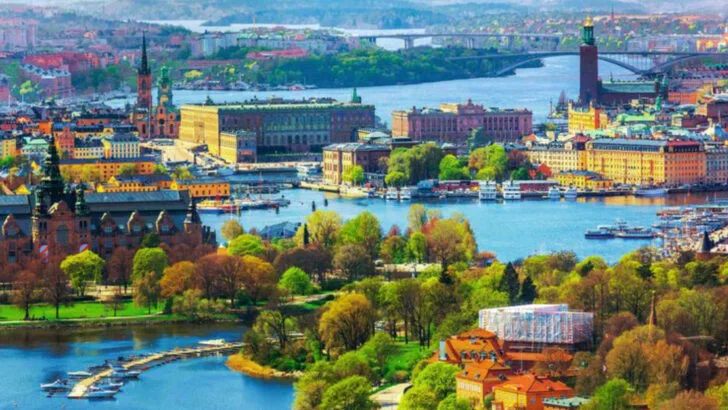English might be a global language—but don’t count on being understood everywhere you go. In some countries, you’ll be greeted with near-perfect fluency and friendly conversations that make traveling feel effortless.
In others? You’ll find blank stares, confusing signs, and a whole new level of charades. Whether you’re planning a smooth international trip or bracing for a language challenge, knowing where English thrives (and where it doesn’t) can make all the difference.
This list highlights seven countries where English rolls off the tongue like a native song—and seven where it’s more of a whisper lost in translation.
Netherlands
In the Netherlands, English proficiency is almost a national hallmark. Many Dutch citizens, from children to adults, converse fluently in English.
This widespread fluency is partly due to the country’s strong emphasis on multilingual education. English is introduced early in schools, leading to high proficiency levels.
Another contributing factor is the country’s media consumption habits. English-language movies, TV shows, and books are widely accessible and popular. For travelers, this means navigating cities like Amsterdam or Rotterdam is a breeze. You can easily ask for directions or engage in conversations with locals.
Sweden
Sweden is renowned for its exceptional English proficiency. From children to seniors, Swedes often speak English with near-native fluency.
This stems from the country’s robust educational system, where English is a core subject from an early age.
Swedes also consume a lot of English media, contributing to their strong language skills. Whether you’re in Stockholm or a small village, you’ll find English widely understood and spoken. For visitors, this means seamless communication and a rich cultural exchange.
Did you know? Sweden consistently ranks high in global English proficiency indexes.
Denmark
In Denmark, English is not just a taught language but a part of everyday life. Danes typically start learning English in primary school and continue throughout their education.
This results in a population that often speaks English very well.
The Danes’ fondness for English-language media also enhances their language skills. Whether in a bustling Copenhagen café or a quiet village, you’ll find English speakers ready to assist or chat. This makes travel and interaction smooth and enjoyable for English-speaking visitors.
Singapore
Singapore is a melting pot of cultures, and English acts as a unifying language among its diverse population. It is one of the country’s official languages and is used extensively in business, education, and daily life.
The government’s emphasis on English in schools has resulted in a population that speaks the language fluently. Visitors to Singapore will find it easy to communicate, whether ordering food at a hawker center or exploring the city’s attractions.
Fun fact: Singlish, a unique English-based creole, is commonly heard in informal settings.
Finland
Finland’s commitment to education includes a strong emphasis on language learning, with English playing a pivotal role. From young students to professionals, English proficiency is common and encouraged.
The Finns’ exposure to English media and international cultures helps maintain their language skills. Whether at a university or in a business setting, English is frequently spoken.
For tourists, this means you can expect clear communication and assistance when exploring Finland’s beautiful landscapes and cities. English fluency adds a layer of ease to any visit.
Ireland
Ireland, where English is an official language, offers an environment rich in linguistic tradition. The Irish accent may vary, but the people are generally articulate and hospitable.
From vibrant cities like Dublin to picturesque countryside towns, English is universally spoken. This makes Ireland a comfortable destination for English speakers to explore.
Visitors will find engaging conversations easy to come by, whether discussing literature, music, or history, enriching their cultural experience in the Emerald Isle.
Philippines
The Philippines stands out in Asia for its widespread English fluency. English is one of the country’s official languages and is used extensively in education and government.
This proficiency is evident across the archipelago, from bustling Manila to remote islands. Filipinos are often multilingual, with English serving as a bridge language.
For travelers, the ease of communication enhances the experience, allowing for deeper cultural interactions. English-speaking visitors will appreciate the warmth and hospitality of the Filipino people, making their stay memorable.
Japan
In Japan, English fluency can be a challenge for travelers. Despite English being taught in schools, many Japanese people struggle with speaking it confidently.
The language barrier is more pronounced in rural areas compared to cosmopolitan cities like Tokyo. Tourists might encounter difficulty when asking for directions or ordering food.
However, the Japanese are known for their politeness and will often attempt to help despite the barrier. For those planning a visit, learning basic Japanese phrases can significantly enhance the travel experience.
China
China poses a significant challenge for English-speaking travelers. Despite English being part of the school curriculum, fluency levels remain low among the general population.
This is particularly true in rural areas, where exposure to English is limited. In major cities like Beijing and Shanghai, younger individuals might have some proficiency, but the language barrier is still notable.
For visitors, patience and preparation are key. Learning a few basic Mandarin phrases can aid in communication and enrich the overall experience.
Brazil
In Brazil, English fluency isn’t as widespread as in other countries. While English is taught in schools, many Brazilians aren’t comfortable using it in conversation.
This can be challenging for English-speaking tourists, especially outside major cities like Rio de Janeiro or São Paulo. In tourist areas, some English is spoken, but a language barrier can still exist.
Travelers are encouraged to learn basic Portuguese phrases to facilitate their interactions and make the most of their Brazilian adventure.
Russia
Russia offers a unique travel experience, but English-speaking visitors might face language barriers. English is not widely spoken, even in major tourist destinations like Moscow or St. Petersburg.
Russian schools teach English, but practical usage remains limited. Visitors often rely on translation apps or tour guides to navigate the language gap.
Despite this, many Russians are friendly and willing to assist. Learning basic Russian greetings and phrases can enhance interactions and lead to more memorable encounters.
Turkey
In Turkey, English proficiency varies significantly across regions. While major cities like Istanbul have English-speaking populations, rural areas are less fluent.
Tourists may encounter challenges when communicating, especially outside the tourist hotspots. Having a translation app or a pocket dictionary can be quite handy.
However, Turkish hospitality shines through language barriers. Learning a few Turkish phrases can facilitate interactions and enrich the travel experience.
Italy
Italy, known for its rich history and culture, presents some challenges for English-speaking travelers. While tourist areas like Rome and Florence have English speakers, many Italians aren’t fluent.
English is taught in schools, but its practical application varies. Visitors may find communication barriers outside urban centers.
To ease interactions, learning basic Italian phrases is beneficial. This not only helps in communication but also enriches the cultural experience, allowing travelers to connect more deeply with locals.
South Korea
South Korea, despite its global influence, presents English-speaking tourists with some challenges. English is part of the school curriculum, but many Koreans hesitate to use it in conversation.
In Seoul, younger generations might speak English, but in rural areas, the language barrier is more evident. Tourists often rely on gestures or translation apps to communicate.
For an enriched experience, learning basic Korean phrases is recommended. This effort is appreciated by locals and can lead to more meaningful interactions.

